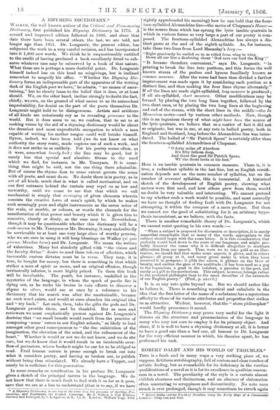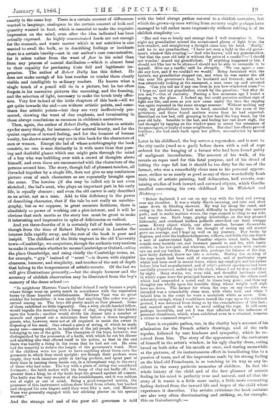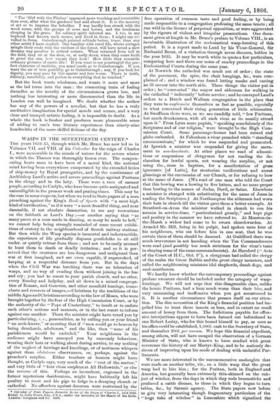ROBERT DALBY AND HIS WORLD OF TROUBLES.* Tins is a
fresh and in many ways a very striking piece of, we suppose, fictitious autobiographY, full of curious and clear touches of artistic feeling, but as remarkable for its deficiency in the routine qualifications of a novel as it is for its excellence in qualities uncom- mon in a novel. The peculiarity of the style is a certain almost childish clearness and distinctness, and an absence of elaboration often amounting to scrappiness and discontinuity. No note once struck is ever prolonged, though it may sometimes be struck again • RoLert Dolby and his World of Troubles, being the Early Days of a Connoisseur London : Chapman and Hall.
exactly in the same key. There is a certain amount of diffuseness wanted in language, analogous to the certain• amount of bulk and quantity wanted in food, which is essential to make the requisite impression on the mind, even after the idea indicated has been actually expresed. As highly concentrated foods are not enough for the stomach, and waste matter which is not nutritive is also wanted to swell the bulk, so in describing feelings or incidents
there is a certain brevity—not in our author's case concentrative, for it arises rather from the want of flow in his mind than from any process of mental distillation—which is almost fatal to their capaCity for producing their full and legitimate im- pression. The author of Robert Dalby has this defect. He
does not make enough of his best touches to render them clearly
visible and intelligible to ordinary readers. He knows what a single touch of a pencil will do in a picture, but he too often forgets in his narrative pictures the mounting, and the framing, and the selection of light, necessary to make the touch truly effec- tive. Very few indeed of the little chapters of this book—till we get quite towards the end—are without artistic points, and some- times fine artistic points—but they are very ineffectively pre- sented, showing the want of due emphasis, and terminating in
those abrupt conclusions so common in children's narratives.
Then, again, the author of Robert Dalby, while he has an artistic eyefor many thingb, for instance;—for natural beauty, and for the quaint caprices of inward feeling, and for the humour of human vanity, has shown scarcely any eye in this book for the characters.of
men or women. Except the lad of whose autobiography the book consists, no one is seen distinctly in it with more than that pass- ing and doubtful glance which one might gain through the mind of a boy who was bubbling over with a crowd of thoughts above himself, and even these are unconnected with the characters of the persons around him. The story, though full of pleasant touches, all threaded together by a single life, does not give us any continuous
picture even of such characters as are repeatedly brought upon the scene. The heroine (if she may be called so) is not even sketched ; the lad's aunt, who plays an important part in his early life, is equally obscure ; and even the old carver is only described as an artist, not as a man. Add to this deficiency in the power of describing character, that if the tale be not really an autobio- graphy, but as we suppose, in great measure fictitious, there is absolutely no power of working out a plot-interest, and it will be obvious that such merits as the story has must be great to make it interesting and impressive in spite of deficiencies so radicaL
And yet three-fourths of it is certainly full of fresh interest,— though from the time of Robert Dalby's arrival in London the interest falls rapidly away, and the rest of the book is poor and insipid. The childhood of the little vagrant in the old University town—Cambridge, we conjecture, though the authoris very anxious to make it uncertain whether he means Cambridge or Oxford,caitiv the place Oxenbridge, and using chiefly the Cambridge terms, as, for example, " gyp " instead of " scout "—is drawn with singular clearness, humour, and simplicity, and touches of the sort of depth that belong to the temperament of artistic reverie. Of the last we will give illustrations presently,—but the simple humour and the accuracy of childish observation may be illustrated from the boy's memory of the dame school :—
" In neighbour Mistress Vane's Infant School I early became a pupil, where things went on pretty much in accordance with the reputation borne by these humble establishments. Mistress Vane was no great stickler for formalities : it was rarely that anything like order was pre- served among us. The boys did pretty much as they pleased. Some of them exhibited no little ingenuity. One, a wiry, shock-headed fellow, would beguile the morning with a lump of clay, shaping it into bricks upon the boards ; another would divide his dinner into a number of morsels and spread out a miniature feast before a dozen imaginary guests, who, however, were not at all required to assist the owner in disposing of his meal. One owned a piece of string, of which he made many uses—among others, in imitation of the jail people, to hang a doll belonging to one of the girls. The champion of the boys, however, was distinguished by the possession of a knife, with which he cut his dinner and anything else that offered itself to his notice, so that in the end there was hardly a thing in the room that he had not cut. He even had the temerity to reduce the length of the governess's wand. Most of the children were too poor to have anything about them save the garments in which they stood upright: yet though their pockets were empty, they took immense pride in having pockets, and spent part of their time in turning them inside out, in a triumphant way, to the envy of those who had none. The boy with a piece of string was considered fortunate ; the brick maker with his lump of clay not badly off ; but, greater than a king, he of the knife kept his ground against all comers. The knife was the very wonder of the establishment, and it was seldom out of eight or out of mind. Being a good-tempered urchin, the possessor of this instrument seldom drew blood from others, but hacked and chopped his own fingers until they were like a saw, and Mistress Vane was generally engaged with her sticking plaster on his special account."
And the strange sad end of the poor old governess is told with the brief abrupt pathos natural to a childish narrative, but which the grown-up man writing from memory might perhaps have managed to tell rather more impressively without robbing it of its childish simplicity :—
"Her end was so lonely and strange that I well remember it. One night my grandfather missed the accustomed gleam of light from the bow-window, and straightway a thought came into his head. 'Emily,' said he to my grandmother, I have not seen a light in the old gayer- ness's window this evening.'—' And who knows,' said my grandmother, 'but that the poor old lady is without the price of a candle ?'—' I should not wonder,' mused my grandfather.. 'If anything happened to her, I should not like her to be alone—I should not be able to reconcile it to myself. Give me a candle,' said he abruptly. We can spare a can- dle any how, and if we couldn't we would.' Being furnished with the lantern, my grandfather stepped out, and when he was under the old elm near the governess's door, he hesitated and listened ; and, as he was attentively looking at the casement, a man came up and accosted him. 'Can you tell me if any one lives in you bow-windowed room?'- ' I hope so,' said my grandfather, struck by the question ; but why' do you ask ?'—Out of curiosity. Passing a few moments ago I heard a tapping on the glass. I looked up, but could perceive neither sign of light nor life, and even as you now came under the tree the tapping was again repeated in the same strange manner.' Without making any reply, my grandfather, lantern in hand, ascended to the room of the governess, and there found matters worse than ho had expected. Stretched on her bed, still grasping in her hand the long wand, lay the poor old lady. Sensible to the last, and feeling her end draw nigh, she had thought by tapping on the window-pane to arrest the attention of the passengers, or haply of some neighbours. But alas! her efforts proved fruitless ; she had sunk back upon her pillow, uncomforted by mortal aid."
Later in his childhood, the boy serves a ropemaker, and is sent to the city castle (used as a gaol) before dawn with a coil of rope ordered for the hanging of a farmer who had been found guilty of malignant incendiarism. The account of his walk, of his reverie on ropes used for this fatal purpose, and of his dread of letting the rope fall lest it should be too dirty for the use of the farmer, who was a remarkably clean man in his personal appear- ance, strikes us as nearly as good as any of those wonderfully fresh little bits of artistic painting, half delineation, half reverie, con- taining studies of both inward and outward objects, which Goethe recalled concerning his own childhood in his Wahrheit cud Diehtuny :— " Before daybreak I set out on my way with the fatal coil swung over my shoulder. It was a windy March morning, and rain and sleet came down in blinding showers. My way lay along the canal, and owing to the darkness, I had much difficulty in keeping the narrow path ; and to make matters worse, the rope seemed to cling to my side, and weary me. Each huge, gaping drawbridge on the way groaned hideously, and overhead leafless pollards stretched out their scraggy arms. Every object which, one after another, became discernible, seemed a frightful shape. Yet the thought of seeing my old master gave me courage, and I kept up well on my journey. Day broke by degrees, and over the leafless hedgerows, willows, and fields the sun threw a sort of amber-tinted light. Familiar objects stood forth, familiar sounds rang harshly out, and boatmen passed to and fro, with hasty strides, on the tow-path and wharves, who seemed to scan with curious eye me and my burden. Perhaps this, perhaps the fulness of the day, now fairly dawned, threw me into a reverie. During the making of the rope much had been said of executions, and of particular ropes which had been used in recent times, which my employer and his father before him had manufactured, and of which pattern specimens had been carefully preserved, nailed up in the shed, where I sat by day, and slept by night. Many stories, too, were told, and dreadful incidents cited, in which ropes were• the principal features, not omitting the silken cord which had suspended a noted earl in times long gone ; and thus my thoughts ran wholly upon the horrible thing whose weight well nigh bore me down. The farmer for whom the rope on my shoulder was intended was a remarkably clean man, with white hair, and when I beheld him in the court he wore a neckcloth white as snow. Con- siderately enough, when I would have rested the rope upon the soddened ground, I was deterred from doing so by the remembrance of this fact ; and exerted myself in order to avoid soiling the rope. It will seem perhaps incredible, and yet I was that affected by the influence of personal cleanliness, which, when exhibited even in a criminal, remains a virtue to command respect."
There is exquisite pathos, too, in the charity boy's account of his admiration for the French artist's drawings, and of the rude repulse, followed by rare kindness and sympathy, which he re- ceived from him. The story of the appearance of the caricature of himself in the artist's window, in his ugly charity dress, eating bread on both sides of his mouth at once, and staring meanwhile at the pictures, of its instantaneous effect in humiliating him to a passion of tears, and of the impressions made by his strong feeling on the kind old Frenchman, is as touching in its way as any in- cident in the many pathetic memories of children. In fact the whole history of the child and of the first glimmer of artistic feeling in his mind is perfectly true and natural, and all that the story of it wants is a little more unity, a little more connecting feeling derived from the inward life and hopes of the child whose experience it describes. The artistic criticisms the book contains are also very often discriminating and striking, as, for example, this on Gainsborough
" The 'Girl with the Pitcher' appeared more touching and irresistible than ever, after what the gardener had said about it. It is the mastery of art so to impress the beholder. I was hardly less struck with the wood scone, with the groups of cows and horses, and the herdsman sleeping in the grass. Its solitary spirit infected me. I, too, in my boyhood had known such scenes, and lived in them ; I might say re- velled in them. Gainsborough painted solitude better, truer, than any other artist I have studied. One familiar with rural life, where cottages mingle their roofs with the verdure of the forest, will have noted a slow dreamy way peculiar to retired cotters. When returned from toil in the field, they sit at the door, or, at early dawn, when they come forth to greet the sun, how vacant they look ! How little they resemble ordinary pictures of rustic life ! If you want to see pourtrayed the per- fect character of rusticity, you must needs go to Gainsborough. If you want the air of true gentility, go to Gainsborough ; nay, if you look for dignity, you may pass by this master and fare worse. There is truth, delicacy, sensibility, and pathos in everything that he touched."
But the book wants wholeness, and wants it more and more as the lad turns into the man : the connecting train of feeling dwindles as the novelty of the circumstances grows less, and nothing less interesting or more disconnected than the life in London can well be imagined. We doubt whether the author has any of the powers of a novelist, but that he has a truly meditative imagination for special moods and scenes, and a very clear and tranquil artistic feeling, it is impossible to doubt. As a whole the book is fresher and produces more pleasurable sense of adding to one's true literary experiences than ninety-nine hundredths of the more skilful fictions of the day.






































 Previous page
Previous page